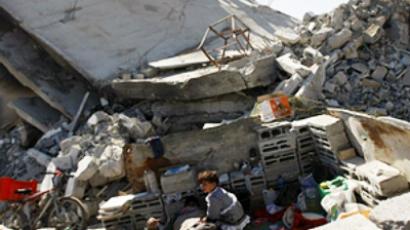‘Maybe I should have died’ – female face of Gaza tragedy
In an effort to maintain control, Hamas is giving away millions of dollars to Gazans. Despite Hamas’s money, an 18-year-old Gazan survivor says she would rather have died in the conflict than live on with her disability.
Eighteen-year-old Mona Al-Ashkar lost her left leg, and half her body was paralysed, when an Israeli shell hit the United Nations school where she and her family were hiding.
Mona’s mother prayed for her death while she lay unconscious for two weeks in Gaza’s Al-Shifa hospital.
In their current situation neither Mona no her mother have any hope for the future.
“I used to dream of going to university and becoming a math’s teacher,” said Mona. “I wanted to marry and have children, but now only God knows if I can. Which man is going to marry a girl in my situation?”
As getting married is the only form of security available to a woman in Gaza, Mona’s tragedy is even deeper. If the girl does one day find a groom, he’s almost certain to be much older than her and he is likely to take her as a second wife only as an act of charity.
Mona says that to survive for her may have been worse than to die:
“I heard somebody say I was dead,” the girl said. “They said ‘she’s dead, she’s dead.’ Maybe I should have died. Maybe it would have been better.”
There’s very little people here can do for Mona – or for the hundreds of other civilians caught up in the war with Israel. Most patients from the same hospital as Mona will have to rely on themselves once they leave its doors.
In spite of this Hamas party officials maintain their success in the conflict:
“Hamas is stronger and more popular, not only in Gaza, not only on the West Bank, not only in Palestine, but also in foreign countries,” said Ihab Alghsen, a spokesperson for Hamas Interior Ministry.
The party is pushing home the message that it won the war against Israel and is still in control, spending millions of dollars on the people of Gaza. It’s giving more than $US 1,000 to families who lost someone and handing out $US 650 to people who were injured.
Some, however, believe that the handouts are far from solving long-term problems people in Gaza will face. Civil society activist Amjad Shawa believes that it is the lack of the better future which makes people cling on to their last hope – Hamas.
“People here – homeless, jobless… they are directed to Hamas, which became a kind of symbol of victory, a symbol of resistance,” said Amjad Shawa. “If you give these people real hope for their future, I think things will be different completely.”













